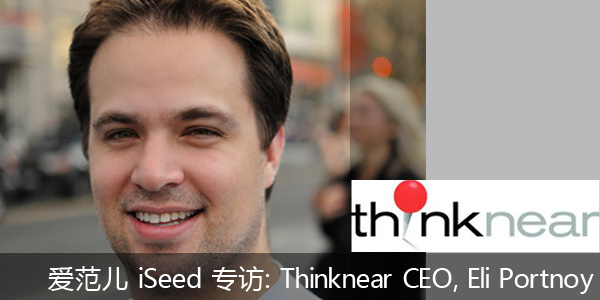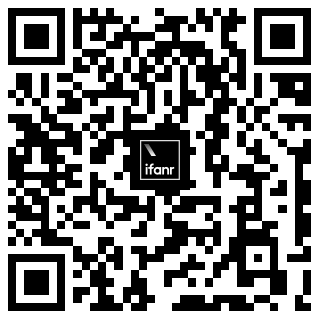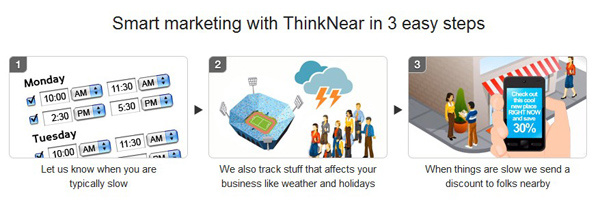
ifanr 海外访谈:Thinknear,为本地商家提供最佳营销服务
Read the English version here
团购网站近来遭遇的各种质疑让市场和许多人们重新思考大量金钱和人力投入真正为消费者和商家带来了什么。ifanr 在之前的文章中有过这样的思考:商家本不希望消费者聚集在一起,去争取一个价格上的折扣与他对赌。同时,消费者也不乐意因为价格折扣而降低了服务/商品的品质。团购好似一位衣着华丽的“隐性”杀手正在改变市场中各方的均衡位置。而市场已经察觉到了这点。在这样的大环境下,我们看到了在今年“诞生”于 TechStars 的初创公司 Thinknear。
Thinknear 是一家深度结合地理位置和营销的科技公司。它所提供的 API 为本地商家提供了一种有别于团购和传统优惠券的新型促销方案。它很“聪明”,体现在能在正确的时间为本地商家找到就在周围的消费者,并能提供最适合的优惠幅度。而消费者则可通过手机应用中的广告自动获得就在他们周围商家的优惠券。相比诸如 Groupon 等团购网站的“价格秒杀”策略,Thinknear 所带来的新模式让我们眼前一亮,也促使了我采访 Thinknear 团队的想法。
接受此次 iSeed 专访的正是 Thinknear 的 CEO 以及创始人 Eli Portnoy 先生。他本科毕业于企业家摇篮——宾夕法尼亚大学,并之后在哈佛商学院获得了 MBA 学位。这位曾被赞为“最酷的年轻企业家”(Inc. 杂志),“最优秀年轻企业家”(商业周刊)曾是 Amazon 的产品经理,帮助其建立了视频点播业务。
关于团队
ifanr: 感谢你接受我们的专访,首先先谈一谈你的团队吧。你是如何结识现在公司的 COO 和 CTO 的呢?能否与 ifanr 的读者们分享一些有关你团队的有趣故事?
没问题。Thinknear 是一家非常年轻的公司,但我们优秀的团队成员都有着非常资深的行业背景。负责软件工程的 John Hinnegan 是之前与我一起在 Amazon 工作的同事。我们是经由一个共同的朋友介绍认识的。刚开始的时候,John 只是经常来到我位于西雅图的家中做客,我们会一块交流和讨论各种商业点子和想法。就这样在我家中的几次头脑风暴之后,我非常清楚我想要和 John 一起工作并一起创造出一个非常优秀的项目。但是,当时 John 却没有立即答应我,而是邀请我一起出去喝一杯,看看是否我们在工作之外的时间也很合得来。幸运的是,即使在我们畅喝了十几杯之后他依然非常希望和我搭档一起工作。
在我们决定一起搭档之后,我们又通过在 Amazon 的一位同事结识了 David Tannenbaum。他在普林斯顿得到了完成了本科学习之后,在牛津大学完成了哲学硕士的学位,并最后获得了耶鲁的法学博士。加入我们之前,他正为联邦通讯委员会(FCC)工作,任务就是遵循“互联网中立”的原则来确保中小企业在互联网行业中能够持续创新。他还曾供职于洛杉矶的两个联邦法庭,为改革知识产权法保护创新提供了许多意见。David 如此非凡的资历使得我在和他的第一次通话之后就立即决定要亲自与他见面。我相信 David 当时在我们通话之后一定比我更加激动,因为他在我们通话之后的第二天早上7点就已经从东部飞来了我们位于洛杉矶的办公室(笑)。他的激情和果断切实感染了我们,让我们坚信我们组成的团队在工作一定会一马当先。
关于创意/产品
ifanr: 那么是什么激发了你们建立 Thinknear 的想法,在实现“将本地顾客和商家带到一起”这个目标时团队遇到最大的困难是什么?
比任何事都重要的是,我们非常希望帮助本地商家在正确的时间发现正确的消费者。我们目睹了市场在团购等网站兴起时所唤起的极度兴奋的气氛。虽然这对消费者而言的确很吸引人,但这并没有帮助本地商家。我们非常希望为本地商家提供能使他们同样受益的科技,工具和解决方案。我们预感到现在的 Thinknear 是个令人激动的巨大机会。
我觉得我们最大的挑战来自于理解本地商家的心态并据此建立一套真正能为他们服务的解决方案。就像我之前提到的,许多商业模式都是从消费者的利益角度出发的。同时,创造一个真正为商家可持续发展的工具需要非常理解他们的业务。因此,我们总是尽最大努力,通过与客户每日频繁的交流来使他们确信我们非常关注他们的需求。
ifanr: 折价券在美国非常流行,相比传统的纸质折价券和团购网站的大幅优惠,Thinknear 最独特的优势是什么?实际效果理想吗?点击购买转化率大概有多少?
折价券在美国的确非常普遍,但是他们几乎总是促使消费者在商家本已繁忙的时段前来消费。这不仅没有达到商家本身的初衷,更加重了他们的负担。我们所做的是帮助本地商家仅仅在他们有多余运能的时候找到附近的消费者,并吸引他们来消费。这就好比航空公司希望通过折价和降价来促销飞机票,因为这对他们而言一个航班10位乘客和100乘客所需的花费是近似的。小型商家也具有类似的动态曲线。所以,当商家在低于正常运营负载(运营曲线低谷)时我们就会自动提供即使优化的营销手段帮助他们带来合适数量的消费者。
很抱歉,我们在此阶段不方便透露具体的统计数字,但是到目前为止,可以说使用我们服务的商家普遍对结果感到满意,我们的业务正在快速增长中。
ifanr: 目前,Thinknear主要将折价券置入在哪些APP中?为何选择使用移动广告网络而非单独开发相关的应用呢?这样的优点在哪里?
我们的 API 是我们公司业务的核心。现在有许许多多优秀的应用帮助消费者与真实世界中的地理位置互动。所以,我们觉得创造另一个类似的应用并不会对增加整个“生态圈”的价值。与之替代的是,我们利用那些拥有极佳用户体验的应用来帮助我们传播我们的优惠广告,这不仅将帮助开发者从他们优秀的应用赚钱,同时也让我们具有更大传播力以此使得我们客户的产品和服务让更多消费者知道。这是三方共同获益的最佳方案。
ifanr:Thinknear 如何分析/预测消费者行为?怎样保证广告的有效性和对消费者而言的价值度?
是的,我们当然会根据本地消费者行为优化优惠数量,并且尝试给予消费者在合适的最大优惠以吸引他们去商家店内消费。抱歉我并不能透露太多关于 Thinknear 算法的内容,可我们持续监控的多项变量因素能确保我们理解和预测消费者的潜在意向,这包括了优惠券投放的范围,时间点,折价幅度,商家的类型在内的几百种变量。随着我们业务的持续开展,我们的数据库也在不停获取更多的数据,这进一步提高了我们的分析能力和计算精度。
关于商业模式/计划
ifanr:你认为目前流行的团购模式对本地商户是利多还是弊多?
这非常取决于公司的业务类型。笼统来说,生活中每件事在适度的情况下都是好的,但现在每日优惠的网站打破了商业中应有的平衡。其实,许多类型的商家不应使用团购营销因为这只给他们产生了天花乱坠的夸张广告;而本来适合使用团购营销的商家也因为使用过度而适得其反。总之,目前市场不是一个最佳均衡。相反,Thinknear 却是对市场有益的产品。我认为,团购网站的“光环”将逐渐褪去,而成为市场营销方案中一个根据具体情况实施的特定工具。
ifanr: 感谢你非常精到的回答。那你是如何理解LBS的呢?你认为LBS已经拥有一个成熟的盈利模式了吗?从消费者方和商家方两者看,什么是成就 LBS 商业环境的重要因素?
单单谈及LBS 是一个非常宽泛的概念,所以我很难给你一个很完整的答案。我确实相信智能手机大大推动了消费者与实际地理位置交互方法的革新。许多正在涌现的服务也正是利用了这点。另一件我相信的事情是没有任何别的事情比提供小范围本地的优惠,更加能从地理位置中创造价值了。随着这类服务帮助商家促进这一趋势的发展,我相信一个成熟的盈利模式自然就形成了。
ifanr: 最后我们想问的是,目前 Thinknear 只在纽约开放了服务。公司的下一步计划是什么?有进军海外(中国)的计划吗?
我们非常希望能在中国开展业务,但是我们需要一个非常耐心且可持续的发展过程。我们仍然是一个非常年轻的公司,我们的产品在进军国际前仍需要更多打磨酝酿,我们非常希望在不久以后可以踏足中国市场。
后记:在与 Eli的访谈中,始终听他谈及的是市场化可持续的发展模式,这或许正是目前团购网站扎堆却难以盈利的根本原因。作为观察者,我们期待看到更多更良性的商业模式出现,为市场增加灵活性,这对消费者和企业都是一件难得的好事。
ifanr 力求将更多创新的新鲜种子和想法带给读者,将【iSeed】 延伸至海外,我们美国团队成员开始选取美国的创业团队进行深度独家访谈报道,若你发现任何新鲜、靠谱、有趣的创业项目,欢迎推荐或者联系我们[email protected]。
Read the Chinese version here
Massive investments marketing and sales led the market to reevaluate the true value of group buying websites. In our previous analysis on the euphoria of group buying websites, we concluded that collusion among consumers is unfavorable to merchants because it rectifies consumers’ bargaining power. Meanwhile, a trade-off between the quality of a product and cheaper price is rather high to consumers. Group buying websites may seem to be benevolent to both consumers and merchants because it reduces the prices for consumers and attract a bigger pool of buyers for merchants. However, the strategy of group buying websites does not aid in sustainable growth of businesses and thus disrupt the market equilibrium. Under such circumstances, a new startup, Thinknear, which was funded by TechStars in 2011, caught our eyes.
Thinknear aims to be the next level of intermediator between local merchants and customers. Its API offers a new automated solution by combining LBS technology with digital marketing. Unlike other group buying websites and traditional paper-based coupons, Thinknear only disseminates merchants’ coupons at targeted time to customers who are physically around the local merchants. Based on its algorithm, Thinknear optimally provides discounts for customers through mobile ad networks.
Fortunately, we had the chance to interview the founder and the CEO, Eli Portnoy. He graduated from the University of Pennsylvania, known as the cradle of future’s entrepreneurs. He also earned MBA degree at Harvard Business School in 2009. Eli was named one of the “Top Young Entrepreneurs” by BusinessWeek, the “21st Coolest Young Entrepreneur” by Inc. magazine, and a “Top Entrepreneur Under 30” by NY Daily News. Before he started Thinknear, he served as a product manager at Amazon.
About the team
ifanr: Thank you very much for accepting our interview invitation. First, would you like to talk about your team? How did you know COO and CTO personally? Would you like to share any interesting stories about your colleagues with our readers?
Sure. John, who runs engineering, I met while at Amazon. We were introduced by a mutual friend and it’s been a fantastic partnership since. The first few times we started hanging out, John would come to my house in Seattle and we would brainstorm ideas for our business. After a few of these sessions it was clear I wanted to work with John, but he had other ideas. He wanted us to go drinking and see if we enjoyed spending time outside of “work” before he would commit. Fortunately, even after a couple of drinks he still wanted to partner up and we started working together.
John and I met David through a friend at Amazon. His credentials were unbelievable and so I instantly wanted to meet him after speaking on the phone. I think David was even more excited and flew himself to LA to meet us the very next day at 7am. That passion and hustle really resonated with us, because ultimately we believe that a team that works hard will always come out ahead.
About the idea/ product
ifanr: What drives you to come up the idea of Thinknear? In order to “bring local customers and merchants together”, what is the biggest challenge so far to achieve this goal?
More than anything, we really want to help local businesses find the right customers at the right time. We saw euphoria in the market with Daily Deals and Group Buying platforms that were a great idea for customers, but did not help local businesses. We wanted to build technology, tools, and solutions for local businesses that helped them. We thought and know now that this is an exciting and big opportunity.
The biggest challenges are understanding the mindset of local businesses and building a solution that really works for them. Most approach the problem from the consumer’s perspective, but really building a sustainable tool for merchants requires a very deep understanding of how they run their business. We try to solve this by speaking to our customers on a daily basis and making sure we stay very focused on what their needs are.
ifanr: Coupon is very common in the US. Compared with other traditional paper-based coupon and group buying websites, what is Thinknear’s unique advantage? Does it work indeed? Would you provide us some stats such as the click to buy conversion rates?
Coupons and discounts are becoming very common in the US, but they are almost always geared towards sending merchants more customers during their already busy times. We help local businesses find customers nearby only when they have excess capacity. Much like an airline is willing to discount or reduce pricing when the flight is empty because it costs the same to fly a plane with 10 people or 100; small businesses often have similar dynamics. So we figure out when a business is below capacity and we automatically create optimal campaigns to drive the appropriate number of customers.
We are not currently disclosing stats other than to say merchants have been very happy and we are growing quickly.
ifanr: Currently, What kinds of Apps have added Ads powered by Thinknear? Why not develop an individual app instead of integrating with existing apps? What’s the advantage of this idea?
Our API is core to our business. There are so many great applications that help consumers interact with their location and building another one doesn’t add value to the ecosystem. Instead we want to leverage all of the great experiences out there and allow app developers to pull our discounts. This lets them make money from their great apps and allows us to extend our distribution and send our merchants more customers.
About the Business model/plan
ifanr: Does Thinknear try to analysis / predict consumers’ behaviors? How to make sure that Ads are effective and worthwhile for potential consumers?
Yes, we definitely optimize the discount amount based on consumer behavior and try to send merchants customers at the lowest discount necessary to get consumers in the door. However, I cannot delve too deeply into our algorithms and technology, other than to say we are consistently monitoring multiple variables that help us understand what resonates with consumers. This includes radius from offer, time of day, discount amount, type of business and hundreds of other factors. Our data-set continues to grow the longer we are in the market and our abilities to make better decisions for our merchants and customers improve.
ifanr: In terms of the business mode, do you think group buying websites (Groupon) are good for local merchants or not?
It really depends on the business and the specifics. Everything in life is good in balance and right now daily deals are not in balance. Many merchants who should not be using them are because of the hype and even those that should are doing them too often. This is not a good equilibrium, but we will get there and then daily deals will be one of many marking tools merchants use depending on their specific needs.
ifanr: What’s your understand of LBS? Do you think that LBS has already had a clear profit model? What are key factors on both consumer’s side and merchant’s side do you think to better the LBS environment?
LBS describes such a broad category of applications so its difficult to give you a good answer. I do believe that smartphones enable consumers to interact with their location in a way that is truly revolutionary and many services will emerge that take advantage of this. The other thing I believe is that there is no way to better monetize location than offers, deals, and ads for things to do nearby. As these services emerge and tools to help merchants leverage these trends are built, I think a natural monetization strategy will emerge.
ifanr: Currently, Thinknear is only available in NYC. What’s the company’s next step? Have you planned to expand your business overseas such as China?
We would love to be in China, but we need to take a patient and sustained approach to our growth. We are still a young company with a product that requires a bit more nurturing before we are ready to expand internationally. We hope to be there soon though.
Throughout the conversation with Eli, he constantly emphasized on the importance of a sustainable development for a successful business and expressed his company’s concern for the local merchants. I think it might perfectly answer the question why current group buying websites are still losing money. As the observer, I always look forward to seeing more and more sustainable business models appearing on the market because the diversity and flexibility of the market will eventually benefits both merchants and customers.

















